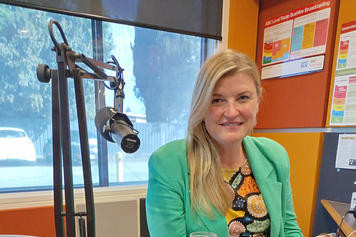General News
4 June, 2024
Lowe determined to rise above debilitating illness
Rebekah Lowe is understandably apprehensive about the future, but she's determined to take whatever action she can to ensure the smoothest possible path ahead.

Ms Lowe, the ABC's Horsham-based radio presenter, is experiencing the early onset of Parkinson's disease.
During Parkinson's Week last month, while speaking to an on-air guest about the illness she calmly and bravely informed her listening audience that she had also been diagnosed recently with Parkinson's.
"I pre-recorded that interview," Ms Lowe said. "I knew I couldn't just say it straight out. It took many takes and a lot of tears."
Parkinson's, a progressive illness that affects the nerves, usually results in problems with movement; causes tremors, painful muscle contractions, difficulty with speech and sleeping; and results in other health issues.
There is no cure, although remedies and medication can reduce the symptoms.
More men have the illness than women.
Ms Lowe said the word "Parkinson's" had surfaced over the past couple of years but each time had been dismissed.
When, after a string of medical tests (including with three neurologists) she was told it was Parkinson's, she felt devastated while at the same time slightly relieved that there was finally a diagnosis.
Although, she added: "I still can't believe it."
At 46 this was not the medical explanation she expected. There was no hand tremor, only a slight foot tremor. Besides, the family had no history of the illness.
Ms Lowe, who has been in radio for 27 years and an ABC presenter for nine in Mount Gambier, Mildura and Broken Hill before making the Wimmera her home, said she thought it might have been just back trouble.
"At the time the neurologist said he hated to tell me it might be Parkinson's," she said.
"I burst into tears. I told him I was too young and didn't have any relatives with Parkinson's."
A further detailed - and costly - scan more than two months later at the Austin Hospital confirmed the diagnosis.
"By then I was feeling unwell, going downhill medically, having trouble sleeping and noticed disruption in my speech," Ms Lowe said.
The specialist neurologist in Melbourne contacted a Horsham-based movement-disorder nurse.
That was the trigger for more answers.
"My nervous system was out of whack and that was causing body disruptions," she said.
She also noticed that her speech was slurred and her handwriting was reducing in size - both common with Parkinson's sufferers, Ms Lowe was told.
She has now swapped her computer screen from black writing on a white screen to white words on a black screen - one of the little changes that are making a huge difference and allowing her to continue her work in radio.
Ms Lowe said she was determined to take every possible measure to maintain the highest levels of health and slow progression of the illness.
Massages, speech therapy, physiotherapy, brain retraining and regular exercise are some of the measures she's using.
She said she also planned to take up singing and gym work.
"I need to keep as fit as possible and will fight harder than if I were healthy," she said.
Her diet, too, has altered. Inflammatory foods such as sugar, gluten and dairy are out. Trauma and stress are also to be kept at low levels.
She knows she's not alone. Film and television star Michael J. Fox developed Parkinson's at 29. English comedian and star Bill Connolly, now 81, is also a sufferer.
Ms Lowe praised Horsham's ABC staff for providing incredible support and encouragement.
They were also introducing small changes to allow her to better cope at work, she said.
Her goal is to continue working and remain in Horsham but she said she realised progression of her illness would most likely dictate the next step.
"I have a good eating plan and will work as long as possible. I have to do everything I can.
"I have a lot of hope for the future," she said.
"I feel positive and have a good mindset. This won’t kill me but it will disable me."
Ms Lowe's parting words were something to ponder: "And did you know that the Wimmera has five per cent more cases of Parkinson's per head of population than other places in the state?"
Read More: Horsham